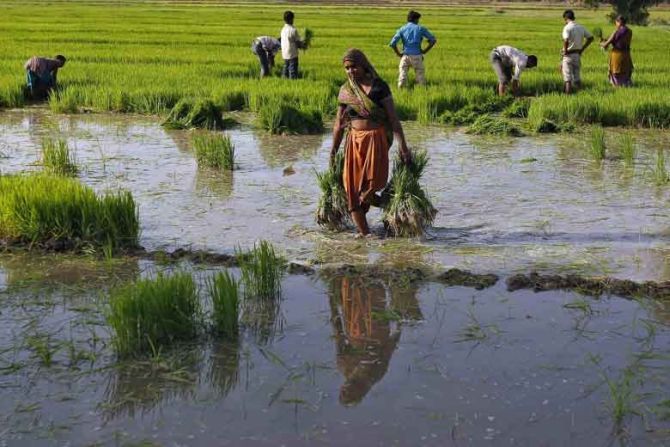Critics said a 10-plus per cent annual increase in incomes is a tall order, given that between 2002-03 and 2012-13, farm incomes grew yearly by 3.6 per cent.

The official committee to recommend on the aim of doubling of farmer incomes in five years has said the soil health card scheme should be extended to the water health of farms and to link this with fertiliser management systems.
The panel has released two new volumes of an intended 14-volume report. Six of these have been issued till date; the rest are being prepared.
The two latest ones focus on sustainability in agriculture and extension services.
In the earlier ones, the committee had estimated the average real income of a farmer household could rise to Rs 219,724 by 2022-23 from the 2015-16 base year of Rs 96,703, with extra public and private investment of Rs 6.4 lakh crore at 2011-12 prices.
For the targeted 10.4 per cent annual increase in farmers’ income from 2015-16 to 2022-23, it says additional private investment of Rs 1.31 lakh crore is required (at 2011-12 prices) and public investment of Rs 5.08 lakh crore.
Critics said a 10-plus per cent annual increase in incomes is a tall order, given that between 2002-03 and 2012-13, farm incomes grew yearly by 3.6 per cent.
The new volumes say to boost the nutrition in soils, pulses cultivation should be promoted in a big way, to meet the nitrogen requirement.
And, that the model legislation on groundwater usage that proposes statutory permission to sink new borewells, establishment of protected zones around drinking water sources and other measures be immediately implemented.
Also, re-categorisation of country’s agro-climatic zones because of climate change, to develop new practices on sustainability.
In like measure, a shift in cropping patterns, involving a system of more pigeon-wheat or maize-wheat instead of only rice and wheat in the Indo-Gangetic plains.
The report also called for distributing carbon-credits to farmers and building drought-tolerant, photo-insensitive, pest and disease resistant breeders.
On extension services, that these be promoted through c0operatives and farmer-producer bodies.
Extension services should organise more buyer-seller meets.
They also suggest using surplus land in Krishi Vigyan Kendras (KVKs) to develop agri-business opportunities for farmers.
“Each KVK is in possession of about 50 acres, providing ample opportunity for developing these.” KVKs, numbering around 680 and run by both Centre and states, are supposed to be the frontline for extension services and are usually located in rural pockets.
Photograph: Amit Dave/Reuters












 © 2025
© 2025